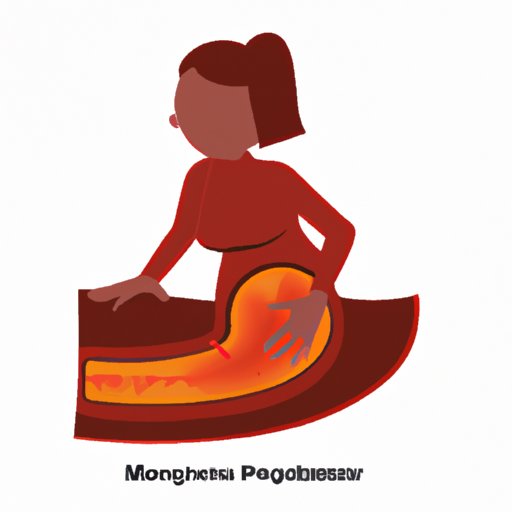
Introduction
There is a common belief that a woman cannot get pregnant while on her period. While this is true, there is a related question that many women who experience unexpected bleeding during pregnancy may ask: Can you still get a period while pregnant? In this article, we will explore the different types of bleeding during pregnancy and whether menstruation is possible.
Fact or Fiction: Debunking the Myth – Can You Still Get a Period While Pregnant?
The short answer is no – you cannot have your period while you are pregnant. A menstrual cycle occurs when the uterus lining sheds as a result of an unfertilized egg, followed by a surge of hormones to prepare for a new egg. However, when pregnant, the body produces hormones that prevent ovulation, which means there is no unfertilized egg to shed.
One misconception is that implantation bleeding can be mistaken for a period during pregnancy. Implantation bleeding occurs when the fertilized egg implants into the uterus lining, causing mild spotting for a few days. However, this is not a menstrual cycle.
Understanding the Different Types of Bleeding During Pregnancy
While having a period during pregnancy is not possible, it is not uncommon for women to experience some form of bleeding or spotting. Here are the different types of bleeding during pregnancy:
Spotting
Spotting is defined as light bleeding, which can occur at any point during pregnancy. It can be brown or pink in color and may last a few hours or a few days. Spotting is usually not a cause for alarm, although it is important to monitor any changes and report them to your healthcare provider.
Implantation Bleeding
As mentioned earlier, implantation bleeding occurs when the fertilized egg implants itself into the lining of the uterus. This type of bleeding is usually light and lasts for a few days. It may occur around the same time as a woman’s expected period.
Heavy Bleeding
Heavy bleeding during pregnancy may indicate a problem, such as a miscarriage or an ectopic pregnancy. It is important to seek medical attention immediately if a woman experiences heavy bleeding during pregnancy.
Placenta Previa
Placenta previa is a condition where the placenta covers the cervix, which can cause bleeding during pregnancy. It is important for a woman to receive prenatal care to monitor this condition. In severe cases, a cesarian delivery may be necessary.
The Surprising Ways Pregnancy Affects Your Monthly Cycle
Although menstruation is not possible during pregnancy, pregnancy can still impact a woman’s menstrual cycle. Here are a few ways pregnancy can affect your monthly cycle:
Missed Periods
As previously mentioned, pregnancy hormones can prevent ovulation, which means a woman will miss her period.
Irregular Periods After Pregnancy
After giving birth, it may take a few months for the body to return to its pre-pregnancy state. This means a woman may experience irregular periods before they become regular again.
Changes In Menstrual Symptoms
Women may experience changes in menstrual-related symptoms during pregnancy, such as cramps or headaches.
Why It’s Important to Know the Difference Between Spotting and Menstruation During Pregnancy
While spotting during pregnancy is common, it is important to distinguish between spotting and menstruation. Here are a few tips to help:
Color and Duration
Spotting is usually brown or pink in color and lasts for a few hours or days, whereas menstrual bleeding is bright red and can last for several days.
Amount
Spotting is usually light, and a woman may only need to use a panty liner. Menstrual bleeding is usually heavier, and a woman may need to use a tampon or pad.
Communicate With Your Healthcare Provider
It is important to communicate any changes in bleeding or spotting to your healthcare provider. They can help determine if there are any underlying issues that need to be addressed.
When to Worry About Bleeding During Pregnancy
While spotting is usually not a cause for alarm, there are instances when a woman should seek medical attention. Here are a few warning signs to watch for:
Heavy Bleeding
Heavy bleeding during pregnancy may indicate a miscarriage or an ectopic pregnancy. Seek medical attention immediately if you experience heavy bleeding during pregnancy.
Severe Pain or Cramping
Severe pain or cramping may indicate a miscarriage or other underlying issue. Seek medical attention immediately if you experience severe pain or cramping during pregnancy.
Decreased Fetal Movement
If a woman notices a decrease in fetal movement, it is important to seek medical attention immediately. This may indicate a problem with the pregnancy.
Conclusion
While a woman cannot have her period while pregnant, it is important to understand the different types of bleeding during pregnancy and the impact pregnancy can have on a woman’s menstrual cycle. If you experience abnormal bleeding or spotting during pregnancy, it is important to communicate with your healthcare provider to determine if there are any underlying issues that need to be addressed.





